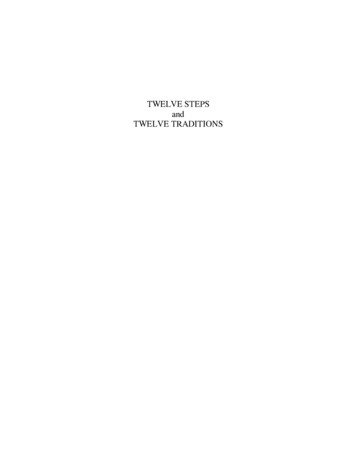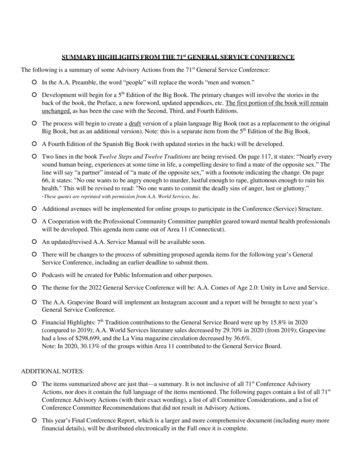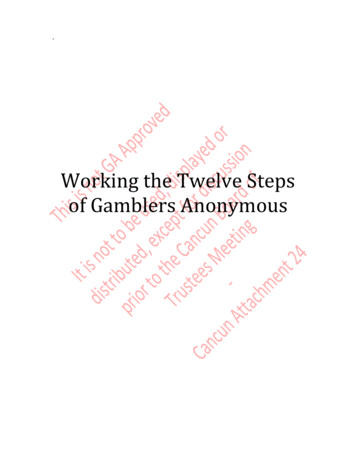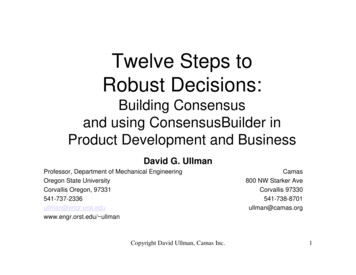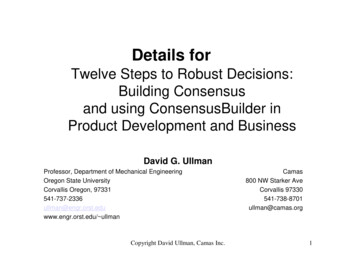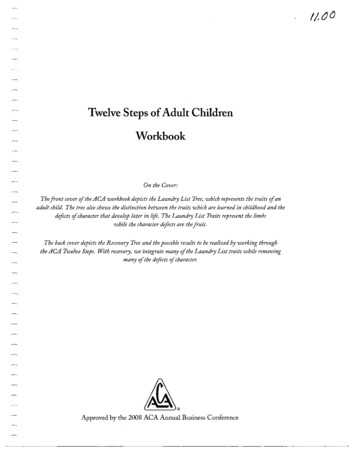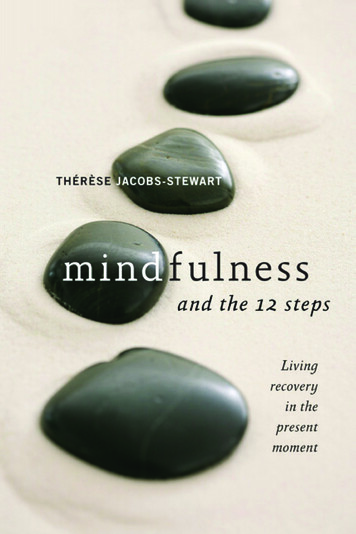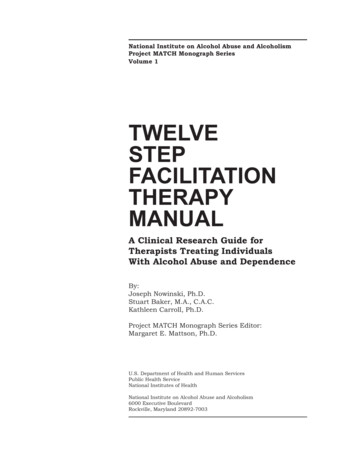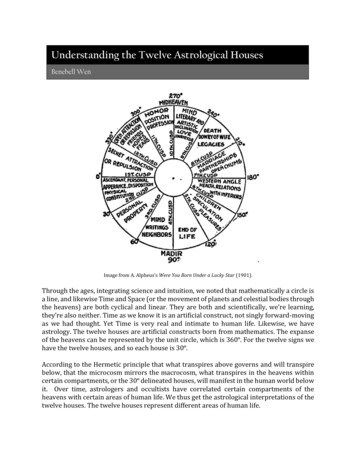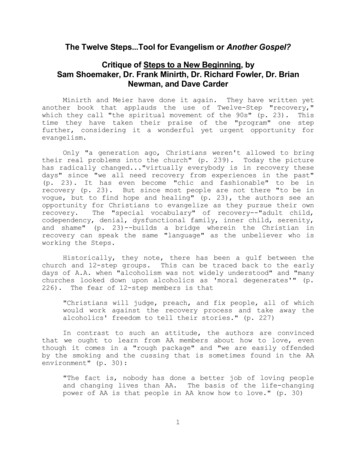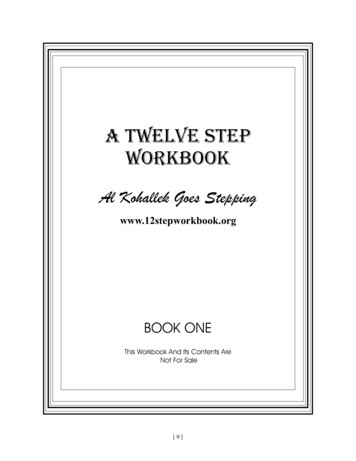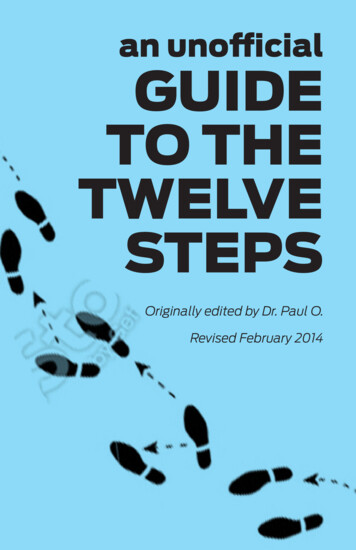
Transcription
an unofficialGUIDETO THETWELVESTEPSOriginally edited by Dr. Paul O.Revised February 2014
DedicationThis book is dedicated to all who benefit from using it.1st printing, Jan 1990 – 2,000 copies2nd printing, Jan 1991 – 5,000 copies3rd printing, Apr 1993 – 5,000 copies4th printing, Nov 1995 – 5,000 copies5th printing, May 1997 – 5,000 copies6th printing, Oct 1998 – 10,000 copies7th printing, June 2003 – 5,000 copies8th printing, Jan 2006 – 5,000 copies9th printing, June 2009 – 5,000 copies10th printing, March 2014 – 3,000 copiesDr. Paul’s original creditsThanks to Wayne R. for the initial computer work and toJim A. for the revision work and the logo on the back cover.Greg M.’s creditsA very special thanks to Paula Ohliger – for all of her yearsof support for this Step Study booklet and for keeping herfather’s recovery work alive! Jim A. for help with the graphicsand history/bio. And to the very special group of people thathelped Greg get this revised edition ready in early 2014:Paula O., Beau B., Mike E., and Marybeth A.History of the Unofficial Guide: see pages 30 – 31
An Unofficial Guideto the Twelve StepsWritten by A.A. Members in TexasEdited by Dr. Paul O., author of the “Acceptance Story”on page 418 of the fourth edition of the Big Book.ForewordThe following is a suggested format for a Big Book Step Study Meetingwith emphasis on the Fourth Step. Quotations from AlcoholicsAnonymous and the Twelve Steps and Twelve Traditions are withpermission of A.A. World Services, Inc. This does not imply either approvalof or endorsement by this organization which, I understand, feelsalcoholics should find their own way in their spiritual quest.The material is presented here in a form which has been used by bothindividuals and groups of recovering alcoholics in Texas to study the first164 pages of the Big Book while actually doing the Steps. Their words havebeen modified somewhat by the original editor (Dr. Paul O.) who assumesfull responsibility for all errors, inaccuracies and misinterpretations.The 10th printing was edited by a few people – including: Greg M.,Paula O., Mike E., Beau B., Jim A. and Marybeth R. Very little was changedfrom previous printings – minor grammar, updating quotes from the 3rd tothe 4th edition of Alcoholics Anonymous and adding a history page.1
A Message from the EditorWelcome to The Land of Beginning Again! If you aren’t satisfied with theway your life has been going and you’d like to chuck the whole thing andstart all over again, then you hold in your hand a tool for doing just thatand for doing it right this time. Beginning again, in the opinion of the editor,is what the Twelve Steps of Alcoholics Anonymous are all about.The book Alcoholics Anonymous, referred to on the dust cover as “theBig Book, the Basic Text for Alcoholics Anonymous”, contains 575 pages.Personal stories, some of which change with each new edition, makeup two-thirds of the book. Only 164 pages, the first third of the book,specifically outline the AA way of life. These pages never change. Theyare divided into eleven chapters, only seven of which are devoted to anexplanation of specific Steps. Each chapter has a title appropriate to theStep(s) covered:Ch.1 Bill’s Story .Step 1Ch.2 There Is a Solution.Step 1Ch.3 More About Alcoholism.Step 1Ch.4 We Agnostics.Step 2Ch.5 How It Works. Steps 3 and 4Ch.6 Into Action. Steps 5 thru 11Ch.7 Working With Others. Step 12It’s these 12 Steps, these seven chapters, a mere 103 pages which, whenwe allow them, change the course of our lives.2
Before You BeginWhile the Fourth Step Guide on pages 17 through 25 can be used byindividuals working alone, the remainder of The Unofficial Guide to theTwelve Steps was developed for use by a Step Study Team.Experience has shown that Teams are most successful when:The first one or two meetings are organizational only. This gives peoplean opportunity to either drop out or to make a commitment to stay untilthe end.The size of the Team is whatever is convenient and what works for yourgroup or team. As an example – the original booklet said this: People areasked to not join once the meetings get started. (This is a meeting of aStep Study Team, not an AA Group.). However, you can make it work sopeople can come and go – or call yourself a group – whatever works – aslong as you remain focused on the goal: Actually Doing The Steps!The Team extends the time spent on any one Step if necessary, butfrequent or frivolous delays tend to kill everyone’s enthusiasm.Each member makes a commitment to read the assignment andanswer the questions before the meeting.Each member accepts a “Buddy” to contact regularly between meetings.Each member attends every meeting and actually DOES each Step as itis encountered. (Fifth Steps are NOT shared at the meeting.)To enhance the Step Study experience – you can choose to not readeach chapter during each meeting – instead have each team memberread that chapter before attending.You may find it advisable to start the meetings on time and end themwhen they are over.3
1ST MEETING PREFACE & FOREWORD, DR’S OPINIONOn Your Own:Read the Preface and the Foreword to the First, Second, Third and Fourth Editions.Note that in the Foreword to the First Edition, the Big Book states:“To show other alcoholics precisely how we have recovered is the mainpurpose of this book.” On page 29 at the end of Chapter 2 it says, “Further on,clear-cut directions are given showing how we recovered.” These statementspoint out the task the team is about to undertake.With the Group:Discuss the purpose, plan and meeting format of the Step Study Team. It isimportant that each member understand he or she is expected to do eachof the Steps and, if possible, to attend every meeting of the team. This is acommitment, a team effort.Frequent progress reports and mutual support via the telephone during theweek are important.At the first meeting read and discuss The Doctor’s Opinion.Are you aware that your illness affected both your mind and your body?Do you believe or can you accept the concept of an allergic reaction to alcohol?What is an allergy?Do you agree with the idea of hospitalization?Have you ever experienced the phenomenon of craving? (page xxviii)Did you like the effect of alcohol?Did you reach the point where you could not differentiate “the true from the false”?Did your alcoholic life seem normal?The doctor seems to say that a “psychic change” must occur. What is apsychic change?Can you accept the fact that alcoholism “has never been, by any treatmentwith which we are familiar, permanently eradicated?”These and many other questions will occur to the group and each should bediscussed in depth.g4
2ND MEETING BILL’S STORYOn Your Own:Buy a notebook and begin to note your reactions to the matters set forth inthe Doctor’s Opinion. Begin to write “How I was powerless over alcohol.” Itis important that you write out any reservations you still have that you are,indeed, powerless over alcohol.Read Chapter 1, Bill’s Story, and be prepared to discuss at next week’s meetinghow it applies to your life.With the Group:Read Chapter 1, Bill’s Story.Did you ever wonder if you were crazy? (page 5)Did you ever feel the remorse, horror and hopelessness of the next morning?(page 6)Did your mind ever race uncontrollably? (page 6)Did you ever seek oblivion? (page 6)Did you feel lonely? (page 6)Did you feel fear? (page 6)What was your reaction to religion, the church and God? (page 10)Note what happened to Bill’s prejudice against “their God” when he began touse his own concept of God. (page 12)Did you know that “nothing more was required.to make my beginning” than awillingness to believe? (page 12)Notice how Bill was instructed to find God’s will and to pray. (page 13)Isn’t it true that Bill essentially takes the First through Eleventh Steps at thistime while still in the hospital? (page 13)These are just samples of the sort of questions to be asked or points to beraised. What was of particular significance to you in this chapter? What didyou find that you can’t agree with or that you can’t accept?g5
3RD MEETING THERE IS A SOLUTIONOn Your Own:Read Chapter 2, There is a Solution, and be prepared to discuss your reaction tothis chapter next week. Continue to write how you are powerless over alcoholand begin to consider what in your life you can truly manage. As thoughts occurto you about whether or not you can manage your life, write them down in yournotebook. Read Step 1 in the Twelve Steps and Twelve Traditions.With the Group:Read Chapter 2, There is a Solution.Having read this chapter, what parts apply to your life?What is your reaction to the members of Alcoholics Anonymous?Did your alcoholism engulf “all whose lives touch the sufferer’s”? (page 18)What was their reaction?Do you see how you can reach another alcoholic? (page 18)Note on page 20 the Book answers the question, “What do I have to do?”Have you been asked the questions on page 20 by yourself or others?What were your answers?From your examination of yourself and your reading of this chapter, are you a“real alcoholic?” (page 21)If not, why not? Discuss this with the team.Did you have control over alcohol? Did you do absurd and incredible and tragicthings while drinking? Were you a Jekyll and Hyde type of person? These questionsand the observations on page 21 may help you in answering the questions you’vebeen writing about having to do with your powerlessness over alcohol.Why did we drink the way we did? (page 22)Why do we take that first drink?Why can’t we stay on the wagon?What has become of the common sense and will power that the alcoholic stillsometimes displays with respect to other matters?Have you lost the power of choice as described on page 24?Have you ever asked, “What’s the use anyhow?”6
Re-read the first paragraph on page 25 starting with “There is a Solution” andthe second one which says, “The great fact is this and nothing less: That wehave had deep and effective spiritual experiences which have revolutionizedour whole attitude toward life.” The rest of this paragraph is an outstandingsummary of what happens in this program.In conjunction with the above two paragraphs, read, discuss and understandAppendix II, Spiritual Experience, page 567.Note that Appendix II, Spiritual Experience, is referred to once again on page 27.g4TH MEETING MORE ABOUT ALCOHOLISMOn Your Own:Read Chapter 3, More About Alcoholism, and determine how it applies to yourlife. Read Step 2 in the Twelve Steps and Twelve Traditions.With the Group:Read Chapter 3, More About Alcoholism.Did you have “the great obsession?” (page 30)Did you realize it was an illusion?Did you try to control your drinking?Were you able to diagnose your disease?In your notebook, have you listed those things which you attempted and whichfailed to control your drinking?Do you have a reservation of any kind or any lurking notions that you will someday be immune to alcohol? (page 33)Do you identify with the mental states that precede a relapse into drinking,and do you understand that these mental states are “the crux of the (drinking)problem”?Do you understand why an alcoholic or potential alcoholic will be absolutelyunable to stop drinking on the basis of self-knowledge? (page 39)Note, on page 43, the doctors’ reaction to these conclusions about alcoholism.At the bottom of the page and at the end of the chapter, once again note theonly defense against the first drink.g7
5TH MEETING WE AGNOSTICSOn Your Own:Read and be prepared to discuss Chapter 4 next week. By now you shouldhave finished writing most of your memories about why you are powerlessover alcohol and why your life is unmanageable. Read Step 3 in the TwelveSteps and Twelve Traditions.With the Group:Read Chapter 4, We Agnostics.Do you accept the fact that if you are an alcoholic, you have only two alternatives:either die an alcoholic death or live life on a spiritual basis? (page 44)Have you lacked the power to manage your life? (page 45)Note: The main object of this book is to enable you to find a power greaterthan yourself which will solve your problem.Have you had honest doubts and prejudices about God? (page 45)What was your reaction to the word “God”? (What will He look like; what will itbe like when you find Him?) Where did you get these ideas?Had you abandoned the idea of God completely? (page 45)Are you willing to lay aside your previous beliefs and prejudices and havemerely a willingness to believe in a power greater than yourself?What is your current concept of God? (page 45)Do you now believe or are you at least willing to believe there is a powergreater than yourself? (page 47)Do you recognize that when you say “yes” to this question you are “on yourway”? (page 47)Note that the Book at this point again refers you to Appendix II, SpiritualExperience.What is it about Appendix II, Spiritual Experience that is indispensable?Have you been open-minded, or have you been obstinate, sensitive andunreasonably prejudiced about discussions about God?Did your idea work? Will the God idea work? (page 57)Are you ready to “fearlessly face the proposition that either God is everythingor He is nothing. God either is or He isn’t.” What is your choice to be? (page 57)8
Recall what was said on page 28: If what we have learned and felt and seenmeans anything at all, it means all of us, whatever our race, creed or color,are the children of a living Creator with whom we may form a relationshipupon simple and understandable terms as soon as we are willing and honestenough to try.g6TH MEETING HOW IT WORKSOn Your Own:Read and be prepared to discuss Chapter 5, “How it Works”. In your notebookwrite those things about God which you cannot believe. On another page, writewhat you do believe about God. As you go forward from this point it’s those thingswhich you do believe or which fit into your concept of God which you will beusing, and you can be comforted in knowing that “Our own conception, howeverinadequate, was sufficient to make the approach and to effect a contact withHim.” (page 46). Read Step 4 in the Twelve Steps and Twelve Traditions.List in your notebook examples of how you have been self-centered in the past.With the Group:Read Chapter 5, “How it Works.”Discuss the material from the beginning of the chapter to the end of page 63;i.e., to the end of the Third Step.Do you question whether or not you are capable of being honest withyourself? (If you do, you are not.)Note the state of mind you are asked to have when you start the Steps honesty, fearlessness, thoroughness and a willingness to go to any length.What is the value of half measures?Are you convinced a life run on self-will can hardly be successful?Can you see the effects of self-centeredness in your life?How have you been self-centered? Discuss with the group.Did you know that you cannot significantly reduce self-centeredness bywishing or by trying on your will-power? (page 62)Are you willing to make the decision that is set forth at the bottom of page 62?Note the promises on page 63 that follow the Third Step.Are you sincerely willing to take this Step?At this point many teams witness each other’s Third Step decision byreciting the Third Step Prayer together.g9
7TH MEETING STEP 4, INSTRUCTIONS 1 & 2On Your Own:In your notebook, continue to list instances where you have been self-centered.Start to work on Step 4 using the FOURTH STEP GUIDE starting on page 17.Follow instructions 1 and 2 and write your Grudge ListWith the Group:Read and discuss the FOURTH STEP GUIDE:Instruction 1 - Resentments (pages 17 to 19), and Instruction 2 - Grudge List(Page 19)gHereafter, follow theFOURTH STEP GUIDEon pages 17 to 25 while continuing themeeting assignments which continueon the next page.10
8TH MEETING STEP 4; INSTRUCTIONS 3 - 5On Your Own:Follow Fourth Step Guide Instructions 3 through 5 (pages 19 thru 21).With the Group:Read Instruction 3 through 5 (pages 19 thru 21) and discuss any problem youare having.g9TH MEETING STEP 4; INSTRUCTIONS 1 - 6On Your Own:Complete your work on Instructions 1 through 5 (pages 17 thru 21). Then followInstruction 6 (pages 21 – 22)With the Group:Discuss the work you have done so far and any problems you are having withInstructions 1 through 6 (pages 19 thru 22). Assist those team members whoare having problems with their Inventory. This may include spending time withthem during the week.g10TH MEETING STEP 4; INSTRUCTIONS 7-9On Your Own:Follow Instructions 7, 8 and 9 (pages 22 thru 23).With the Group:Review the writing you have done for Instructions 7, 8 and 9, (pages 22 thru 23)and discuss any problems you or other team members are having.g11
11TH MEETING STEP 4; INSTRUCTIONS 10 & 11On Your Own:Complete Instructions 10 and 11 (pages 24 to 25).With the Group:Review and discuss in general what you have written on sex. Do not givespecifics or tell “war stories”. These are not appropriate for this meeting.g12TH MEETING “INTO ACTION”On Your Own:Read Step 5 in the Twelve Steps and Twelve Traditions.Find someone with whom to take your Fifth Step.Make a specific appointment and take this Step.Read Chapter 6, “Into Action.”With the Group:Read and discuss Chapter 6, especially pages 72 through 75 having to do withthe Fifth Step.Has everyone had a good experience with this Step thus far?Are there any reservations about doing this Step? What are they?Have you skimped on any portion of the Program to this point?g13TH MEETING STEP 5; STEP 6On Your Own:If you haven’t taken your Fifth Step, do so this week.[Don’t worry too much who that person will be. Anyone is better than noone, but because it is a spiritual experience you might want to share it withsomeone in the program rather than with an outsider. - Ed.]Read Step 6 in the Twelve Steps and Twelve Traditions.12
With the Group:Discuss this chapter and the Sixth Step.What is the significance of the sentence, “This is the step that separates themen from the boys.?”Discuss those defects of character which you recognize in yourself which youbelieve stand in the way of your usefulness to your fellows.Consider also those defects which you feel do not stand in the way of yourusefulness to others.Notice how relatively few defects (column 4 in your inventory) caused such along list of resentments (column 1).What are you asked to do about these defects?Is will-power and trying harder a part of this Step?g14TH MEETING STEP 7On Your Own:Read the first two paragraphs on page 76 in The Big Book and Step 7 in theTwelve Steps and Twelve Traditions.With the Group:Read and discuss the assignment.Define and discuss humility and what it means to you.How does one acquire humility?Why are “defects of character” in Step 6 called “shortcomings” in Step 7?Does the Step 7 method of removing defects of character differ from what youhad been taught previously? In what way?g15TH MEETING STEP 7On Your Own:Read from the middle of page 76 to the middle of page 77 in The Big Book andStep 8 in the Twelve Steps and Twelve Traditions.13
Note that The Big Book assumes you made a list of persons you had harmedwhen you wrote your inventory. If you didn’t, complete such a list now. Don’tconcern yourself at this time with whether or not you should, or will be able to,actually make the amends.With the Group:Read and discuss the assignment.Discuss amends and amends lists.g16TH MEETING STEP 9On Your Own:Read and discuss pages 76 through 84 in The Big Book and Step 9 in theTwelve Steps and Twelve Traditions.With the Group:Read and discuss the assignment.Do you have misgivings (page 76) and feel diffident about making amends?What is your real purpose in doing this Step? (page 77)Is timing important?Can you approach the people in your Eighth Step list in a helpful and forgivingspirit? (page 77, pages 66-67)Do you recognize that nothing worthwhile can be accomplished until you cleanyour side of the street? (page 78)How important is it that you be praised for your Ninth Step efforts? (page 78)Do you understand the importance of losing your fear of creditors? (page 78)Have you discussed with your sponsor any criminal offenses you may havecommitted and which are still open? If not, you should do so. (page 79)Do you recognize that your Ninth Step can harm others? (page 79)Do you see the importance of not doing further harm by creating morejealousy/resentment in a ‘tell all’ session? (page 81)What is meant by the statement that the spiritual life is not a theory; we haveto live it? (page 83)Do you agree that in taking your Ninth Step you should be sensible, tactful,considerate and humble without being servile or scraping? (page 83)g14
17TH MEETING STEP 10On Your Own:Read Step 10 in Twelve Steps and Twelve Traditions and from the middle ofpage 84 to the bottom of page 85 in The Big Book.With the Group:Read and discuss the assignment.What are the specific instructions for the Tenth Step?What do we watch for?Why is it important to admit a wrong “promptly”?Note that “We have ceased fighting anything and anyone.by this time sanitywill have returned.we will seldom be interested in alcohol.”Is this the sanity referred to in the Second Step?What is the proper use of will-power? (page 85)g18TH MEETING STEP 11On Your Own:Read bottom of page 85 to end of the chapter.Read Step 11 in the Twelve Steps and Twelve Traditions.With the Group:Read and discuss the assignment.What is the suggestion for taking the Eleventh Step every night?What do we watch for?Do you plan to practice this Step on a daily basis?Discuss in detail the procedure suggested on page 86 regarding dailymorning meditation.What is the precise technique outlined on pages 86 & 87 for finding answersto problems?Has your attitude about a Power greater than yourself changed since studyingThe Big Book thus far?Do you have reason to believe “It works - it really does?”g15
19TH MEETING STEP 12On Your Own:Read Chapter 7, “Working With Others” and Step 12 in the Twelve Steps andTwelve Traditions.With the Group:Discuss Chapter 7.What are the step-by-step requirements for a Twelfth Step.Share with the team any experiences you have had in this regard.Have you ever worked with the family in cases where the alcoholic has notresponded? What was the result?Do you agree that “every man.can get well regardless of anyone. The onlycondition is that he trust God and clean house.”? (Page 98)Is this the basis for the statement that this is a selfish Program? Is the programliterally selfish?g20TH MEETING CHAPTERS 8 THRU 11On Your Own:Read Chapter 8, “To Wives”; Chapter 9, “The Family Afterwards”; chapter 10,“To Employers” and Chapter 11, “A Vision for You”. These chapters are designedto teach you how to practice these principles in all your affairs. They containspiritual truths which apply to all of us.With the Group:The team should decide whether or not to discuss one or more of thesechapters to conclude your Step Study.A reading of the last portion of “A Vision for You” is a fitting way to end theStep Study program.Do you have the feeling of having had contact with those who wroteThe Big Book?g16
Fourth Step GuideMany people find the Big Book instructions for taking the FourthStep confusing.The following outline represents the experience of certainmembers of the fellowship of Alcoholics Anonymous in analyzingand utilizing this portion of the Big Book. In general, those whohave followed these suggestions in taking this Step including theinventory, the analysis and the suggested prayer, have found it tobe a most rewarding and exciting spiritual experience.This same experience may be shared by anyone who completeseach of the following instructions and assignments to the best ofhis or her ability in the order in which they are presented. Perfectionis not required. What is required is honesty, open-minded-ness andwillingness and a sense of having given it one’s best effort.[Don’t concern yourself with the question of who is going to hearyour Fifth Step. Your Higher Power will let you know in plenty oftime. Your Fifth Step is not today’s problem. - Ed.]Do not skip any instruction and complete every instructionbefore proceeding to the next.INSTRUCTION 1 RESENTMENTSRead the following and come to understand what we are doing.WHEN TO DO STEP FOUR AND WHYPerhaps the greatest of the promises of the program of Alcoholics Anonymousis that God, as we understand Him, will do for us what we cannot do forourselves. Once we’ve made the decision to let Him do that, as required byStep Three, the Big Book warns us, “Though our decision was a vital andcrucial step, it could have little permanent effect unless at once followed bya strenuous effort to face, and to be rid of, the things in ourselves which hadbeen blocking us from God (Character Defects) .So we had to get down tocauses and conditions. Therefore, we started upon a personal inventory.”17
WHAT WE SEEKThe inventory is described as “a fact-finding and fact-facing process.” Weseek the truth about ourselves and honestly take stock of our lives. We searchout the flaws in our make-up which caused our failure. The Big Book statesrepeatedly that self, selfishness, self-centeredness are the root of our trouble.Convinced that self, manifested in various ways, was what had defeated us,we consider its common manifestations and group them into three categories:(1) Resentments, (2) Fear, (3) Sex.We then treat each category separately in the inventory.RESENTMENTS “The Number One Offender”From resentments “stem all form of spiritual disease.” We are instructed tolist all the people, institutions or principles with whom we were angry or hadresentments. What’s a resentment?(a) Webster’s New Twentieth Century Dictionary defines “resentment” as“a feeling of displeasure or indignation, from a sense of being injured oroffended.” Suggested synonyms include anger, wrath, ire, indignation.(b) Anger can be strong, intense, explosive, and brief. Resentments oftenare more suppressed, longer-lasting and chronic - the “slow burn”. Aresentment has been described as the feeling I have when I thinksomeone else ought to feel guilty.(c) We are dealing with a destructive, negative, unpleasant action or inactionof a person, institution or principle.The “person” may be oneself. Our actions, or our failures to do what wethink we should have, can generate the resentment referred to as “guilt”.“Institutions” may be authorities, companies, governments, governmentagencies, and groups of people or various organizations. “Principles” are truths,some of which offend us; e.g.1.Alcoholism is an incurable disease.2.Honesty is the best policy3.As you give so shall you receive4.When you are disturbed, no matter what the cause, there’s somethingwrong with you.The specific instructions for taking Step Four are found on pages 64 to 71 in thebook Alcoholics Anonymous and should be read carefully at this time.g18
INSTRUCTION 2 GRUDGE LISTPrepare your Grudge List. List the people, institutions and principles whichhave caused you to have a resentment as defined above.Go back over your life. “Nothing counts but thoroughness and honesty.” If you canremember the resentment, list it even though you think you have gotten over it.Some people choose to write a short autobiography to jog their memory.Reviewing diaries, school annuals, family albums and the like may help.Avoid moral judgment of your feelings. Do NOT concern yourself with whetheror not you should have felt the way you did. Just proceed with making your listand NOTHING MORE now.While completing Step Four and perhaps for some time thereafter, you willrecall other people and situations which caused you to have these negativefeelings. You can add to your list at any time, but do not spend a great deal oftime now worrying about how complete your list is. Simply do the best you canover a reasonable period of time - perhaps a week. (end of assignment)gINSTRUCTION 3 RESENTMENT ANALYSISDO NOT BEGIN THIS ANALYSIS UNTIL YOU HAVE COMPLETED YOUR LISTThen analyze each resentment separately. The Fourth Step will mean verylittle unless we come to understand and learn from our individual resentments.The following procedure has proved helpful to others:19
(a) Purchase a spiral notebook and open it so that you have a blank page oneach side of the spiral in the center. With a ruler, draw a vertical line downthe center of each blank page dividing it into two halves; you now havefour columns. Turn the page and repeat this procedure until several pageshave been divided in this manner.(b) Label each of the four columns:Column 1 -”Name”Column 2 -”Cause” (what happened)Column 3 -”Affect” (why it bothers me?)Column 4 - (Leave this column unlabeled)gINSTRUCTION 4 WHO DID WHATTake one resentment at a time from your grudge list and enter it in Column 1.Then complete Columns 2 and 3 as described below. Complete the analysis ofeach resentment before going on to the next one on the grudge list:(a) Take the first name from your grudge list and write it on the first pageunder Column 1.(b) In Column 2, write a few words to describe each and every event orcircumstance you can recall which caused you to resent the personnamed in Column 1.This is a very important part of the analysis. We learn from specific events, notfrom general complaints. For example, we learn little from the complaint “Helied a lot,” but we learn much from “He told me he wasn’t married.”gINSTRUCTION 5 THE RESULTIn column 3, opposite each of the events listed in Column 2, write the reasonthe event or circumstance bothered you. Ask yourself:(a) Having decided who was at fault, did I go further in my study of this event?(b) Did I try to retaliate, fight back or run? What was the result? Did it help?20
(c) Is it clear to me that a
is what the Twelve Steps of Alcoholics Anonymous are all about. The book Alcoholics Anonymous, referred to on the dust cover as “the Big Book, the Basic Text for Alcoholics Anonymous”, contains 575 pages. Personal stories, some of which change with each new edition, make up two-thirds
